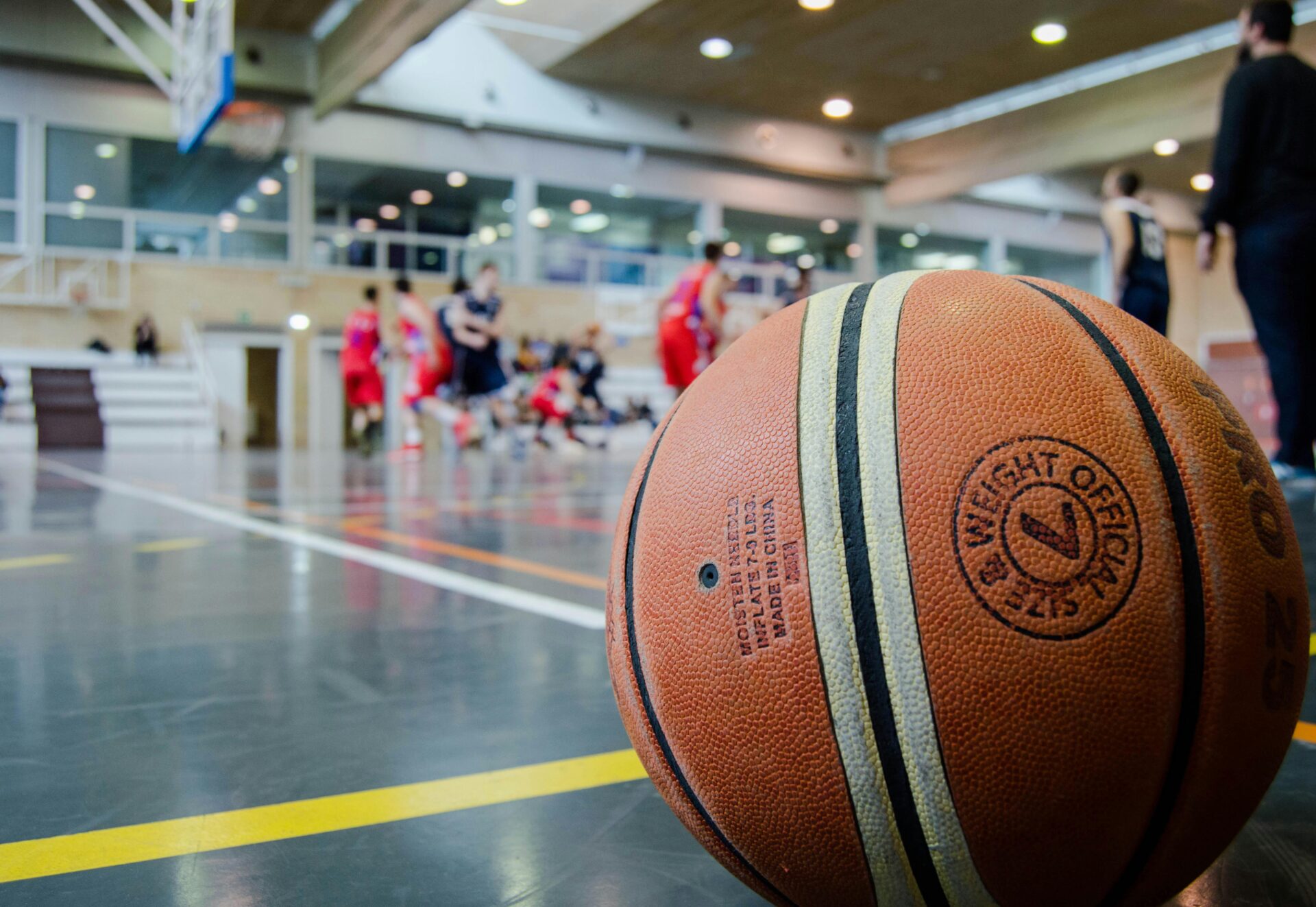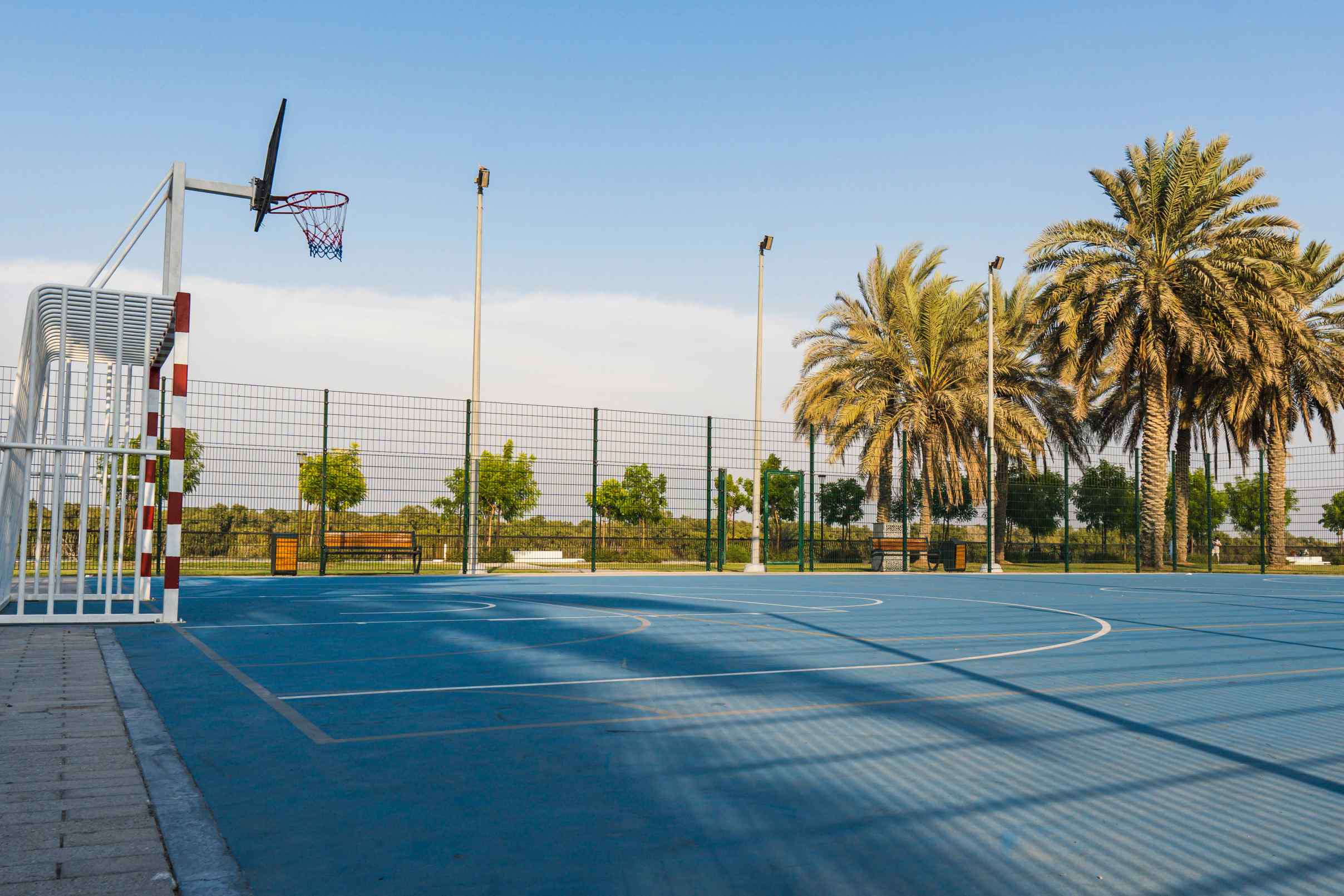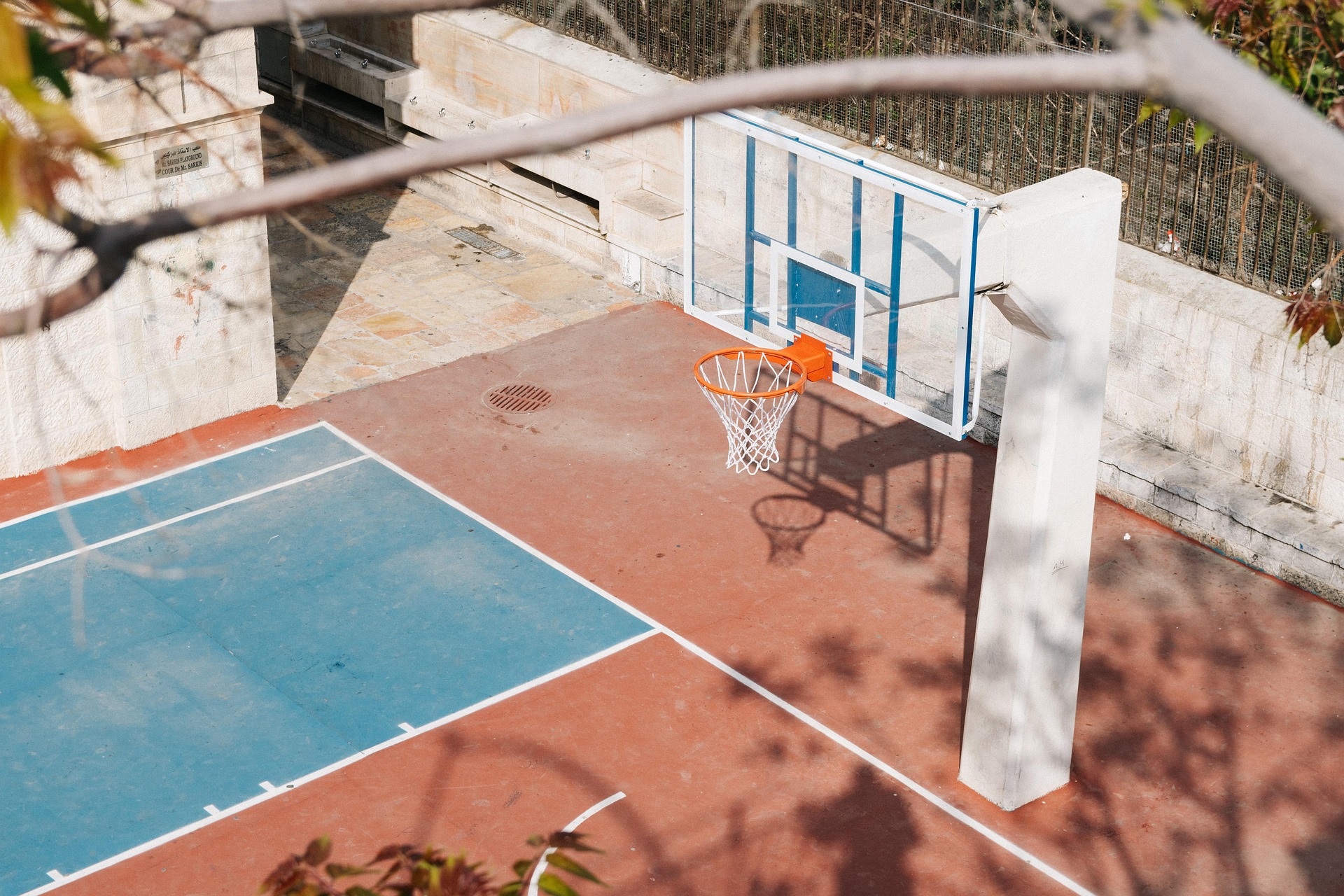Multi-sport courts are the backbone of athletic facilities, providing versatile spaces for basketball, volleyball, badminton, and even yoga sessions. But designing a court that accommodates such varied activities goes beyond just painting lines. The flooring choice is key—a foundation on which athletes rely for safety, performance, and enjoyment.
Choosing the right flooring is a technical decision, requiring a balance between features like shock absorption, durability, and maintenance needs. Wood flooring, despite some challenges, has consistently stood out for its superior performance across multiple criteria. But how does it compare to modern alternatives like polyurethane or recycled rubber?
This article will explore the essential requirements for multi-sport court flooring, highlight why wood remains a top contender, and offer comparisons with emerging alternatives to help you make an informed choice.
What Multi-Sport Courts Demand from Flooring
A multi-sport court’s flooring must withstand diverse activities while ensuring athlete safety, enhancing performance, and enduring demanding usage. Here are the key factors any reliable flooring should address:
1. Shock Absorption
A high level of shock absorption reduces fatigue and minimizes injuries by cushioning players’ movements during quick stops, jumps, and sprints. This feature is pivotal for sports with high-impact motions like basketball and volleyball.
2. Durability
Multi-sport courts face continuous wear from foot traffic, equipment, and environmental conditions. A durable flooring solution should handle intense use while maintaining its structural integrity and appearance.
3. Maintenance
Facilities need flooring that’s easy to clean and maintain, minimizing downtime and operational costs. Flooring should resist stains, scuffs, and damage while requiring only routine care.
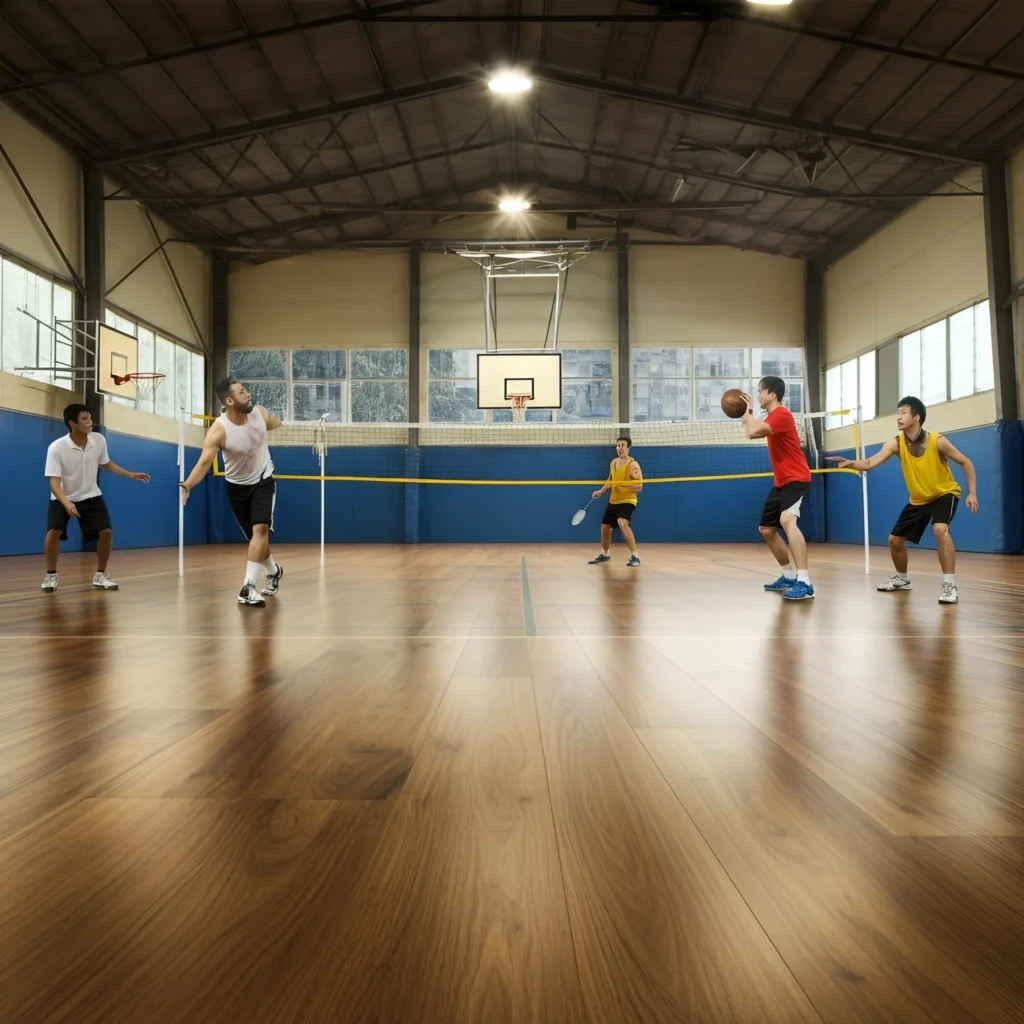
Why Wood Flooring Stands Out
Wood floors aren’t just aesthetically pleasing; they excel in performance, aiding both players and facility managers.
1. Superior Shock Absorption
Solid wood flooring provides ideal elasticity and energy return, essential for athletes’ comfort. Maple hardwood, a popular choice in sports facilities, effectively cushions high-impact movements, reducing strain on players’ joints and muscles.
2. Unmatched Versatility
Wood flooring adapts seamlessly to different activities, from competitive basketball to community yoga sessions. Its uniform surface ensures consistent ball bounce and player footing, making it suitable for a range of sports.
3. Enhanced Aesthetic Appeal
The visual appeal of polished wood cannot be overstated. It gives courts a professional, high-quality look that attracts players and spectators alike, elevating the facility’s overall experience.
4. Long-Term Durability
When properly installed and maintained, wood floors can last for decades, making them a cost-effective solution despite their higher initial expense. With periodic refinishing, scratches and wear marks can be erased, ensuring the floor stays in pristine condition.
Challenges of Wood Flooring
While wood flooring offers undeniable advantages, some drawbacks require consideration to ensure it’s the right choice for your facility.
1. Maintenance Requirements
Wood requires regular upkeep, including cleaning with proper solutions and occasional refinishing. However, setting a consistent maintenance schedule can prolong its lifespan and maintain performance.
2. Susceptibility to Water Damage
Exposure to moisture can warp or damage wood floors. Facilities should employ proper sealing and moisture-control systems to mitigate risks, especially in regions with high humidity.
3. Higher Initial Costs
The upfront expense of wood flooring is often higher than alternatives. However, this is balanced by its durability and long-term value, as cheaper options may require more frequent replacements.
Comparing Synthetic and Rubber Alternatives
While wood is often the go-to choice, alternatives like polyurethane, recycled rubber, and PVC are gaining popularity. Here’s how they stack up against wood flooring in multi-sport courts.
1. Polyurethane Flooring
- Pros: Excellent shock absorption, seamless surface, and high durability.
- Cons: Expensive and can require specialized maintenance compared to wood.
2. PVC Flooring
- Pros: Affordable, water-resistant, and easy to install.
- Cons: Lower shock absorption and comparatively short lifespan. Less ideal for varied sports use.
3. Recycled Rubber Flooring
- Pros: Eco-friendly, highly shock-absorbent, and provides a soft surface.
- Cons: Limited use for high-performance sports, lingering odor, and susceptibility to staining.
4. Acrylic Flooring
- Pros: Weather-resistant and low-maintenance, making it ideal for outdoor courts.
- Cons: Lacks the elasticity and aesthetic appeal required for professional indoor multi-sport use.
5. Biomass Sports Flooring
- Pros: Made from sustainable resources, biomass flooring offers good shock absorption and durability while reducing environmental impact. It’s a commendable alternative for enterprises focused on sustainability.
- Cons: The initial investment cost is higher than that of ordinary solid wood flooring.
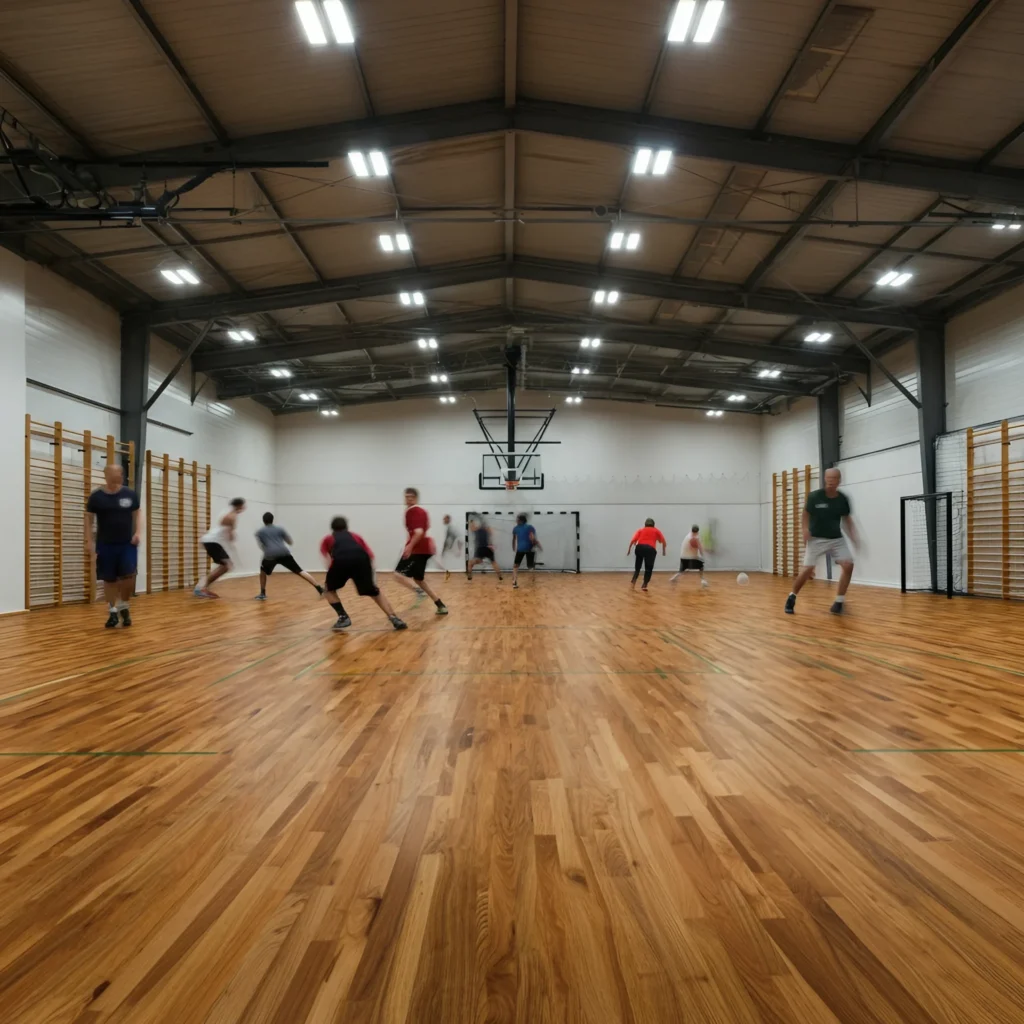
Transform Your Court with the Right Flooring Choice
After analyzing the options, it’s evident that wood flooring is the gold standard for multi-sport courts. Its shock absorption, aesthetic appeal, versatility, and durability make it a standout choice for professional and recreational facilities alike.
While other options like polyurethane have their merits, wood consistently meets or exceeds performance requirements for versatile, high-traffic sports courts.
If you’re ready to elevate your athletic facility, contact us today for a personalized consultation on wood flooring. Our experts can walk you through options and ensure your court is built to perform—and impress—for years to come.
Got questions or prior experience with sports flooring? Leave a comment below—we’d love to hear your thoughts! Don’t forget to subscribe to our newsletter for more expert advice on facility solutions.


